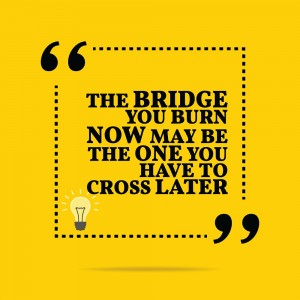There are so many tips and pieces of advice out there for slam dunking a job interview, you could spend hours combing the internet looking for that "one best" bit of wisdom that will give you the edge on the bajillion other candidates applying for the same position that you want. Your dream job. You polished your resume until it was perfect, networked your head off, updated your LinkedIn profile, and locked down all of the personal photos of you doing keg stands in college on your social channels. And you got the call. An interview! In person! Scheduled and confirmed!
You know if you could get your foot in the door and present your best self, the job is yours. You've read all the etiquette advice, have your outfit pressed and ready to go, you've done your research on the company and position. You know exactly what to do, and what not to do. Except one: The biggest "don't" when it comes to interviews.
Not. Showing. Up.
Confused? So are we, but we've heard from dozens of hiring managers and HR pros. It happens. People confirm by email, phone, text, or carrier pigeon. The day of the interview arrives...and they don't show. No email, no phone call, just no show.
Perhaps you found another job? It happens, but when it does you're supposed to communicate with potential employers to let them know you've accepted another offer.
Perhaps you were thinking, “better never than late?” The saying is actually, “better late than never” and most hiring managers will understand—if you communicate by phone instead of strolling in 15 minutes after the scheduled time like being fashionably late gives you an edge. It doesn't, and one simple rule applies for emergencies: If you're going to be late, communicate.
Stuff happens. The dog ate your resume. Your car wouldn’t start. You spilled coffee on your shirt on your way out the door. It might seem like a good idea to pretend you didn’t get held up and let the interviewer think that you were in a terrible accident and are in the hospital without your phone and your jaw is wired shut. But the plus side of communication when something does happen is that it gives you the opportunity to show a hiring manager HOW you handle an issue like a fender bender, spilled coffee, or a traffic jam in an unfamiliar city.
You can screw up an interview in 100 different ways and still get the job. Hiring managers are sometimes willing to overlook certain things—like lack of experience or advanced degrees—if they think you're the right fit culturally and "trainable." But being a no-show (and/or no-call) is a surefire way to get rejected.
PLUS, not showing up for job interview and ghosting your potential employer isn't just poor etiquette; it's a bridge burned. If you found something else, have the courtesy to let the other company know. No town is too large for that kind of bridge burning. You might end up back on the market before you know it and you didn’t just lose a job offer, you lost an opportunity with that company forever.
showing up for job interview and ghosting your potential employer isn't just poor etiquette; it's a bridge burned. If you found something else, have the courtesy to let the other company know. No town is too large for that kind of bridge burning. You might end up back on the market before you know it and you didn’t just lose a job offer, you lost an opportunity with that company forever.
And, if you’re working with a recruiter, you’ve also lost an ally (or allies—they do talk to each other about “fail” stories). And now you have a black mark on your reputation. Trust that the potential employer WILL remember you. He or she will tell others. You will be discussed, and not in a good way.
If a simple email or phone call feels like too much effort, ask a friend to write a short "thank you but I've accepted another offer" email. Ask a friend to call and make pleasant excuses if you're so non-confrontational that you can't do it yourself. Anything is better than not showing up.
